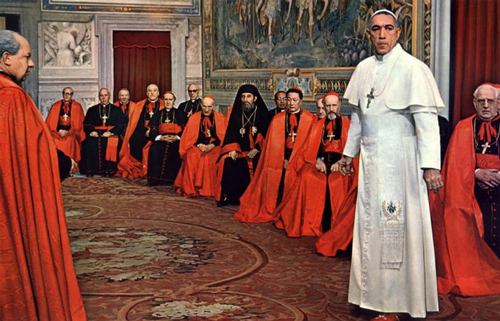Still from the cinematographic version of The shoes of the fisherman.
Tamara Fariñas. Madrid
The pages of many books offer countless stories about the bilateral relations of different countries, diplomatic conflicts and many other aspects that affect international relations directly. Here you have five books that include some real and some fictitious stories:
The shoes of the fisherman / Morris West
Morris West was an Australian author who also worked for the Intelligence Services during the Second World War. The shoes of the fisherman is the first work of a tetralogy in which international policy is a central topic. In the book, the author anticipates the arrival of a Slav Pope 15 years before Karol Wityla turned into John Paul II. The story takes place in the middle of an adverse climate, due to a dispute between the Soviet Union and China.
[Written in 1963]
Persona non grata / Jorge Edwards
The Chilean Jorge Edwards arrived in Havana in 1971 under the mandate of President Salvador Allende to reopen the Chilean Embassy in Cuba and resume the diplomatic relations with the island, which had been broken during Batista’s dictatorship. Three months later, he abandoned the island due to disagreements with the revolutionary government. In Persona non grata Edwards talks about his relationship with Cuban intellectuals or his tense relationship with Fidel Castro. This work was republished recently and presented by the author in Madrid.
[Written in 1973]
The fourth protocol / Frederick Forsyth
Frederick Forsyth is a British writer who worked as a reporter. In his work The fourth protocol, Forsyth tells the story of how the secret services of the United Kingdom ask an agent to uncover a traitor inside the organization. In the middle of a general election which the Soviet Union wants the Labour Party to win, the head of the Kremlin sends a secret agent to England to activate an atomic bomb and make it explode before the election is held.
[Written in 1984]
The constant gardener / John Le Carré
David John Moore Cornwell, better known as John Le Carré, is a British author whose bibliography focuses on espionage during the Second World War. In The constant gardener, Le Carré tells the story of Tessa Quayle’s murder. She is the wife of a diplomat assigned to the British Embassy in Nairobi (Kenya). He starts investigating to find out who is behind his wife’s murder. The investigation takes him to London’s Foreign Office and several European countries in the middle of conspiracies, to discover that the one behind all of it is the pharmaceutical industry and its business in Africa.
[Written in 2001]
Paris 1919: Six months that changed the world / Margaret MacMillan
Margaret Olwen Macmillan is a historian and professor at the British university of Oxford and director of the Saint Anthony’s College. In Paris 1919: Six months that changed the world, MacMillan tells how the world leaders met in Paris in 1919 to attend the Peace Conference. There, the three big world powers, the United States, France and the United Kingdom, faced the challenge of raising Europe from its ruins, getting war repairs from Germany and stopping the advance of the Russian Revolution.
[Written in 2005]





